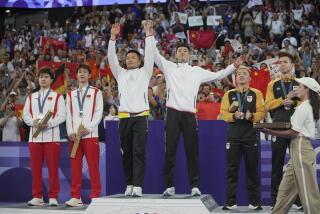One-Shot Debate on 2 Chinas
- Share via
On the eve of Chinese President Jiang Zemin’s historic visit to the United States, Taiwan’s equivalent of the Larry King show came to Los Angeles over the weekend and aired a lively debate on the future of the two nations, bitter enemies since the Communist takeover of the mainland in 1949.
For two hours, Mandarin-speaking callers from Los Angeles to New York and Taipei to Singapore called in to express their views on “Speaking Your Mind 2100.” The television program was broadcast live Saturday night from a glittering banquet of a Taiwan university alumni group, attended by 650 people at the Westin Bonaventure Hotel downtown. The audience loved it--and frequently reacted with applause.
“This is very special,” beamed Grace Hu, a Taiwan-educated Cerritos City Council member, who occupied a front-row seat. A graduate of Fu-Jen University, Hu, like many in the audience, is an immigrant. But she, like others in the room, said they can’t help but care about what happens on both sides of the Taiwan Straight because her fate and that of the more than 1.2 billion ethnic Chinese is tied to what happens in that part of the world.
Attendees said the program’s topic was a big draw. There isn’t a Chinese alive who doesn’t have an opinion on the subject, they said.
The show, broadcast live for the first time in Los Angeles, has a big following among ethnic Chinese living in Southeast Asia, said Francias C.R. Lee, director general of the Taipei Economic and Cultural Office in Los Angeles. His office is the equivalent of the Taiwan Consulate here. Washington cut formal ties with Taiwan in 1979 by recognizing mainland China.
“I want to see an independent Taiwan,” a caller from Los Angeles said, supporting a two-China policy. “Taiwan hasn’t been part of China for more than 100 years. I, for one, would like to see Taiwan become the Switzerland of Asia.”
In recent years, proponents of an independent Taiwan have grown on the island and among Taiwanese Americans, whose Chinese ancestors went to the island many generations ago.
Taiwan, an island 100 miles off the southeast coast of the mainland, was administered by China from the mid-1660s until 1895 when it became a Japanese colony. When Japan lost World War II in 1945, Taiwan reverted to China and in 1949 became the last territory held by the Nationalist government. The Beijing government considers it a renegade province.
With the handover of Hong Kong in July, the future of Taiwan has become a pressing issue for the United States as well.
Another caller, a mainlander residing in Malaysia, urged that China and Taiwan work harder to accommodate each other. “People [on both sides of the Taiwan Straight] don’t want war,” he said. “Both sides should make an effort to understand each other more.”
A caller from Taipei said Taiwan should hold firm as long as mainland China remains a Communist state.
Panelists representing Taiwan’s major political parties--the Nationalist Party, the Democratic Progressive Party and the New Party--flew in from Taipei to be on the program. There was no representative voicing the mainland’s position. Efforts to get a representative of China’s Communist Party were unsuccessful, according to the show’s host, Lee Tao.
The program was broadcast locally on KSCI-TV Channel 18 and seen also in San Francisco, New York, Taiwan and Asia.
The timing of the broadcast, two days before Jiang’s state visit, raised speculation among some in the local Chinese community that it was an attempt to counter pro-Beijing public relations.
But Lee Tao called the timing a “coincidence.”
*
“When I learned that my wife [an alumna of Fu-Jen University], would be receiving an award [by the school’s Southern California chapter], I decided to come with her and at the same time do my program in Los Angeles,” he said.
After the broadcast, he conducted an additional half-hour program on the reaction from the audience, many of them professionals and entrepreneurs from across Southern California’s Chinese and Taiwanese communities.
Alumni association banquets are important social events in the predominantly immigrant Asian American communities, where school ties rank only second to family connections.
Although calls and discussions brought no resolution to the age-old dilemma, the depth of pain felt by countless ethnic Chinese over the ideological split came through clearly.
One attendee stepped up to the microphone during the local segment of the program and displayed a drawing of a proposed flag that combined one large star with four small stars that stood for groups of workers from the mainland flag with a white sun in the sky from the Nationalist flag.
“I want to see a unified China,” he said passionately, holding up the flag for everyone to see.
More to Read
Sign up for Essential California
The most important California stories and recommendations in your inbox every morning.
You may occasionally receive promotional content from the Los Angeles Times.













